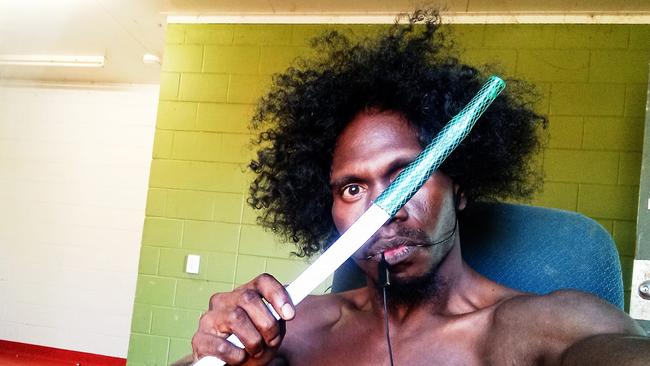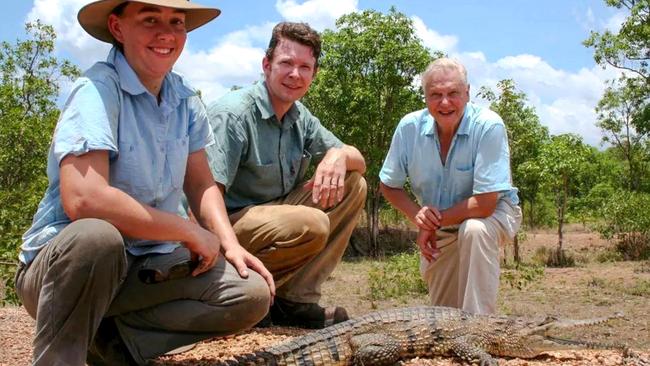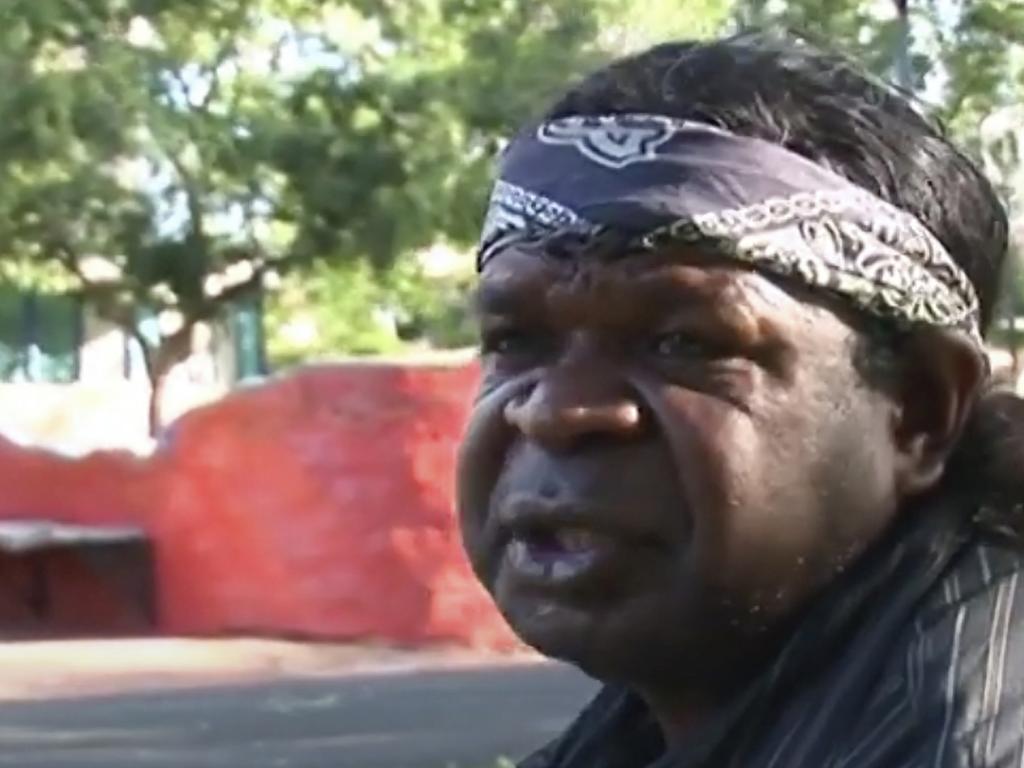Northern Territory courts a revolving door for evil men
Most of August’s criminal roll call in the Northern Territory Supreme Court contained scenes of such graphic violence they might have attracted a warning, were they not so depressingly mundane: adult Aboriginal men inflicting extreme violence on Aboriginal women.

You can now listen to The Australian's articles. Give us your feedback.
Thirty-four people were sentenced in the Northern Territory Supreme Court in August, an unexceptional month except in one respect: the crimes of one defendant were so depraved that Chief Justice Michael Grant excused his court officers from the room and warned others that what he was about to say could cause psychological shock.
Adam Britton’s 63 offences against animals, involving torture, bestiality and the savage deaths of 39 dogs, some filmed in a shipping container in the rural area of Darwin and posted on the dark web, were so aberrant they are instructive to no one but Clarice Starling-types seeking insights into the darkest impulses of the sickest minds.
Most of August’s criminal roll call, like the month before it and every month going back decades, also contained scenes of such graphic violence they might too have attracted a warning were they not so depressingly mundane: adult Aboriginal men inflicting extreme violence on Aboriginal women.
As the Northern Territory welcomes in a new government that has promised to get tough on crime, the focus is on urban Aboriginal youths – the gangs of crims breaking through shop windows, stealing cars and threatening with weapons.
The Country Liberals promise to lower the age of criminal responsibility from 12 to 10 to make kids answer for the over-size damage they cause, to reintroduce spithoods and to reinstate truancy officers to make sure Aboriginal kids attend school.
It raises questions about a more problematic cohort: Aboriginal men aged in their 20s, 30s and 40s, who were kids not so long ago, now being told by judges they are beyond repair as worthwhile members of society.

Perhaps new Chief Minister Lia Finocchiaro understands this, which is why she’s focused on youth crime. It’s a case of saving what you can. But the recidivist nature of adult Aboriginal offending and the extreme violence, usually fired by alcohol, creates each new generation of lost children.
These men bash and maim repeatedly. They have long records. Spells in prison are not correcting them. They have kids and those kids are charting the same course.
Anthony Albanese announced after last week’s national cabinet a $4.7bn plan to tackle gender-based violence proposes action in four areas. “Supporting the critical work of frontline services,” the Prime Minister said. “Turning our eyes on perpetrators to stop violence from escalating. Providing more support for children and young people who’ve experienced violence. And tackling the impacts of alcohol on violence.”
Most of the money, $3.9bn, will go on frontline legal services. Within the smallest portion, $169m, only a smaller amount of that goes to dealing with men, with trials of “innovative models to prevent intimate partner violence and homicide”, and establishing national standards for men’s behaviour change.
There’s nothing in the announcement about teaching boys respect for women – though $80m of the $169m will go to “enhance and expand child-centric trauma-informed supports for children and young people”. That looks like an industry built around a bolted horse.
In the Territory courts, where there is a swinging door of repeat offenders, there is a sense that help cannot come soon enough but, even if it did, it would make no difference anyway. Chief Justice Grant said he needed to apply a value of deterrence when sentencing dog sadist Adam Britton to 10 years and five months in prison, with a non-parole period of six years. But it’s not as if the public needs to be reminded not to rape and kill dogs. As for telling Aboriginal men not to harm women and children, judges have been yelling into that void for decades.
John Nelson, 44, from Yuendumu, faced sentencing in August for striking a female relative in the head with a machete in Alice Springs in 2022, resulting in the woman’s skull being fractured.

Chief Justice Grant considered Nelson “a recidivist offender and a man of extremely poor character” whose prospects of rehabilitation were “practically non-existent”. Nelson went on to assault another female with a weapon while on bail for the machete attack.
Nelson’s history of criminality included six prior convictions of aggravated assaults on females, multiple convictions for assaulting police, deprivation of liberty, threatening behaviour, disorderly behaviour, unlawful entry, stealing and sexual intercourse with a child under 16.
Nelson, who at one stage was a chronic petrol sniffer, has spent most of his adult life in prison. Faced with Nelson’s schizophrenia and anti-social personality disorder, the judge was unable to establish a relationship between his mental illness and the machete attack. He found Nelson was just drunk and aggressive.
When Nelson was very young, his father died from a heart attack and he was raised by an uncle who died when he was nine. He was then raised by an aunt and attempts to reconnect with his birth mother never worked out – she’d started a new family. That kind of background may in some cases activate the High Court’s 2013 Bugmy principles, which hold that if evidence of a severely deprived childhood can be established with repeat adult offenders, it must be given weight in sentencing.
Chief Justice Grant declined to find that the childhood bereavement Nelson experienced constituted profound deprivation or disadvantage. The Bugmy principles were not enlivened. That is to say: the judge found Nelson responsible for his own actions, though the price was not high. Nelson was given a three-year non-parole period.
In August, the Chief Justice also sentenced Lazarus Green, 25, another Aboriginal man whose prospects of rehabilitation the judge said “must be seen as marginal at best”.
Green’s partner was taken by ambulance to hospital with a fracture to her right forearm, a deep laceration to her head and multiple blunt force injuries to the back, arms and legs after suffering sustained and brutal beating with a heavy stick. The attack came on top of Green’s “appalling criminal history dating back 10 years” including multiple convictions for aggravated assaults on females, breaching domestic violence orders, unlawful entry, property damage and stealing.
Green’s parents both did repeated spells in prison when he was growing up in an itinerant lifestyle, moving about the communities and town camps of central Australia. He became a polysubstance abuser and welfare had trouble finding anyone who could take responsibility for him.
Green has never had a job.

Chief Justice Grant found in Green’s case the Bugmy principle had a mitigating effect but that had to be weighed against his propensity for hurting women, meaning that Bugmy effectively cancelled itself out.
Green was sentenced to a non-parole period of 20 months.
Herron Nawirridj, aged 30, was out on bail for belting his partner with an “animal bone” in the top end community of Gunbalanya when he followed that up with a sustained pummelling to the same woman in October last year.
Both were intoxicated and arguing when Nawirridj followed her into Uncle Sam’s 24/7 takeaway in Darwin. She tried to stop him entering the store. He pulled off her shirt and dragged her by the hair outside. He choked her until she was unconscious and fell to the ground. He stomped on her head four times.
She regained consciousness and tried to protect herself. Nawirridj stepped back and kicked her hard in the face, sending her head into a concrete wall. She pleaded with him to stop. Once again, he stepped back and kicked her in the face. He wandered off.
She went into Uncle Sam’s where staff called emergency services. She left before help arrived. Nawirridj found her on the street and they started arguing again. He chased her back into Uncle Sam’s. He swung her to the ground and kicked her to the head five times, then stomped her head four times.
Judge Meredith Day Huntingford said Nawirridj was a teenager sniffed petrol, drank alcohol and lived a transient lifestyle between Gunbalanya, Maningrida and Darwin. His education was limited. His father abused alcohol and was violent. His mother died when he was 14.
Nawirridj, who has seven priors for violent assault, has been in and out of youth and adult prison since he was a teenager. He has been assessed to have a neurological deficit. Justice Huntingford sentenced him to a three-year non-parole period.
As prison doors shut on Nelson, Green and Nawirridj, all for short sentences given the profound repeated violence they have inflicted, it is notable that each man has the same story – differing only in the nature of the assaults.
Dead or dead drunk father, dead or drunk or disconnected mother, barely educated, wandering childhoods, substance abusers since teenagers, disregard for bail, disregard for jail, capable of committing extreme violence on women and each becoming fathers themselves during short-lived times of freedom.
Nawirridj has a four-year-old daughter. Green has three very young children to two partners. Nelson has three daughters of varying ages from three partners. They are fathers by paternity, not deed.
In Nawirridj’s case, Justice Huntingford told him: “You are a person who uses violence and you appear not to have learnt from your previous sentences, including sentences to imprisonment.”
She said his childhood of deprivation and exposure to family violence meant his moral culpability for his crimes – Bugmy, again – was reduced. However, the Catch 22 was that she needed to take into account that his deprived background increased the risk that he would reoffend.
The Bugmy principles can apply to all defendants regardless of race, but with or without Bugmy, the typically short sentences the three men received suggest that Territory courts apply an automatic discount due to Aboriginality. That may be a feature of subconscious bias or it may be a reflection of the exhaustion and futility judges feel jailing Aboriginal offenders, with the only positive being that the women get a reprieve.
Judges always take a person’s background into consideration, although an explanation for the pitilessness of the violence in the cases of Nelson, Green and Nawirridj was absent — although it has become implicit since the 1992 NSW Court of Criminal Appeal ruling on Fernando, which was a forerunner to the Bugmy case.
In that case, judge James Wood said that alcohol did not excuse an offender’s conduct but found that Stanley Fernando, from an Aboriginal community near Walgett who had maliciously wounded his wife after a heavy drinking session, was a reflection of his environment.
The High Court adopted Fernando in the 2013 case of William Bugmy, who grew up in Wilcannia amid alcohol-fuelled violence and witnessed his father stabbing his mother 15 times. In 2011, Bugmy, who was illiterate and suffered from mental illness, threw a billiard ball at a prison guard in the Broken Hill Correctional Centre, blinding him in one eye.
Bugmy was sentenced to a non-parole period of four years and three months, which was appealed to the NSW Court of Criminal Appeal on the grounds it was manifestly inadequate.
The court increased Bugmy’s sentence to a five-year non-parole period. On further appeal, the High Court set aside the upgraded sentence, stating: “The experience of growing up in an environment surrounded by alcohol abuse and violence may leave its mark on a person throughout life. Among other things, a background of that kind may compromise the person’s capacity to mature and to learn from experience.
“It is a feature of the person’s make-up and remains relevant to the determination of the appropriate sentence, notwithstanding that the person has a long history of offending.”
Territory courts generally do not get into philosophical discussions on the origins of the disproportionate violence, but fall back on the Fernando and Bugmy precedents of severe exposure to violence in childhood, which says you are what you learn.
That means courts are clearing houses for crime that are unable to offer solutions to adult men such as Nelson, Green, Nawirridj, and indeed to Fernando, Bugmy and so many others, unless hope is placed in men’s behavioural programs.
Jon Tippett KC, the Northern Territory’s leading criminal barrister, says putting men on alcohol and family violence programs while they’re in prison is a waste of time because the alcoholic repeated wife-basher is in an unrealistic environment where he can neither drink nor bash women.
“It’s silly. You’re teaching them about something they have no access to,” Tippett says. “There’s no alcohol in prison. There’s no wife. An addict that goes in comes out an addict. Same with domestic violence. How do you deal with behavioural change with men that mostly cannot read or write, spend 23 hours in a cell and where everyone else is in for the same thing?
“You can’t teach him not to do it in jail. Men who beat Aboriginal women do not face disapproval within their own communities. They’re not stripped of their position on the local council for beating up their wife. They’re not made an example of. It’s not culturally part of a taboo.”
If Tippett is right, neither the men’s own culture nor the prison system can assist with their rehabilitation – and the acceptance of the Bugmy principles means they are effectively written off from the time of their early childhood. If older repeat offenders are beyond help, that ought not mean there’s no hope at all. Tippett argues that the new federal money must focus on men, but especially boys. “It’s not scientific. Rather than breeding more perpetrators, and funding a whole new industry based on society’s failure, spend the money on young people prior to them get into trouble. And then work on them when they get out,” says Tippett.
“I think Lia Finocchiaro’s focus on the young is right. She can’t offer outcomes immediately, and it’s going to take us a couple of decades to extricate ourselves. But the only reasonable way is to continue to focus on young people.
“We’ve thrown kids into prison and we’ve done it thinking they’ll suddenly become good people. They have instead experienced further brutality and isolation. They’ve already grown up with that, and that’s the reason they’re in prison.
“Everyone is listening to women. That fair enough. They are victims and we need to do the best we can to protect them – but to be truly effective we need fewer perpetrators. Hard approaches on youth can make sense if there’s a capacity for the young to understand the approaches and if they are relevant.
“I believe Lia Finocchiaro is a sincere person. She’s a mother who’s lived in the Territory all her life. She will try and do the best she can. I don’t think she has an agenda against any social group. Quite the opposite.”
Tippett says it is time for brave people to try new things and to be stern. And to be prepared to fail, and to then try other things.
“It’s going to be a tough one,” he says. “Where there’s lack of parental control or parental interest, young people may have to be in prison. Ten-year-old kids may have to be put in an environment where they’re fed and schooled.
“It’s all very well for parents in Palmerston or out in communities to scream about their kids being taken away. But you, parents, are not sending them to school. You are not feeding them. You are not bathing them or clothing them. They have scabies. You are not engaging in their health care. They are below weight and their cognitive abilities have suffered because you are not looking after them.
“It’s a choice. Either you look after them, or somebody else will. We may do that reluctantly. But these children are entitled to an upbringing in a first-world country that gives them a crack at life. If you’re not going to do it, mum and dad, then we are.”



